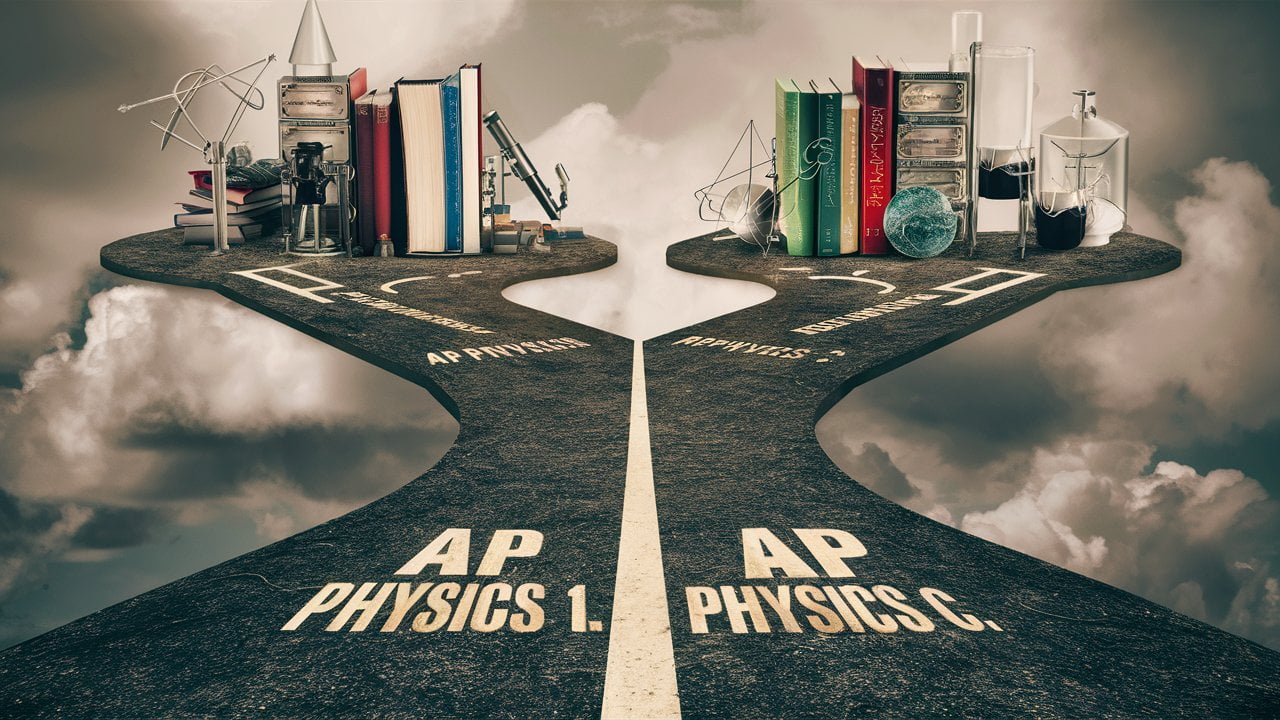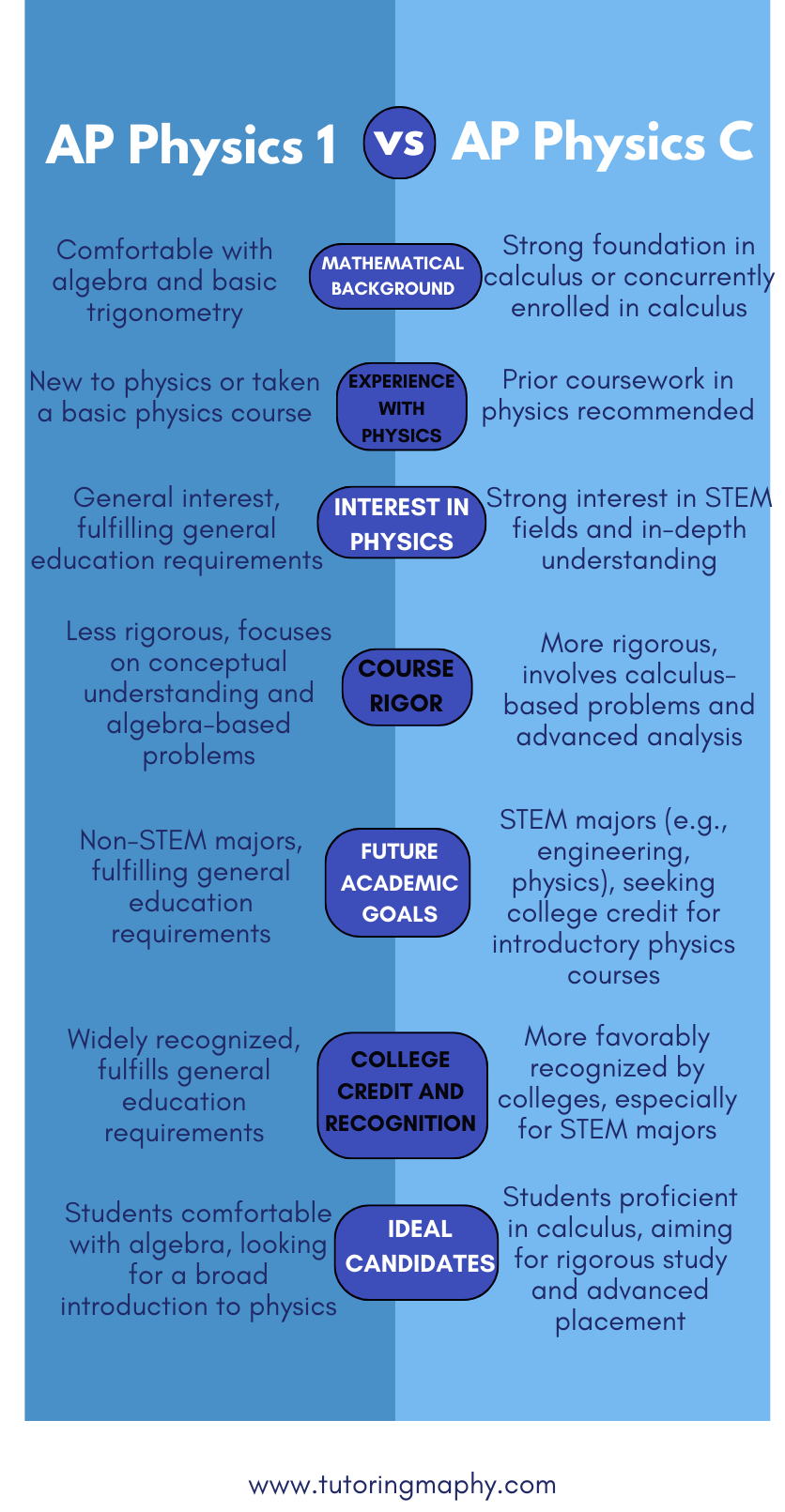Introduction
Answering the question “Which AP Physics should you take” can be a bit like choosing your favorite flavor of ice cream: it all depends on your tastes and what you’re looking for. AP Physics courses are designed to give high school students a taste of college-level physics, but they come in two main varieties: AP Physics 1 and AP Physics C. Each course has its own unique flavor, with different focuses, prerequisites, and levels of difficulty. Understanding the key differences between AP Physics 1 and AP Physics C can help you decide which course is the best fit for your academic goals and interests. Whether you’re aiming to fulfill a science requirement, earn college credit, or simply investigate deeper into the world of physics, knowing what each course offers is the first step in making an informed decision.
Course Content
What You Learn in AP Physics 1
AP Physics 1 is an algebra-based course designed to introduce students to fundamental physics concepts. The curriculum covers topics such as Newtonian mechanics, including motion, forces, and momentum. Students also explore work, energy, power, oscillations, fluids and rotation. The course emphasizes critical thinking, problem-solving, and the application of algebra to physical principles. Labs and hands-on experiments are integral, helping students grasp concepts through practical experience.
*Fluid Mechanics is a new addition in AP Physics 1 from 2024-25.
What You Learn in AP Physics C
AP Physics C, on the other hand, is a calculus-based course divided into two sections: Mechanics and Electricity & Magnetism. Mechanics covers topics similar to AP Physics 1 but goes deeper into the mathematical foundations using calculus. It includes kinematics, Newton’s laws, work, energy, power, systems of particles, linear momentum, rotation, and oscillations. Electricity & Magnetism covers electrostatics, conductors, capacitors, dielectrics, electric circuits, magnetic fields, and electromagnetism. AP Physics C demands a strong understanding of calculus, as it uses advanced mathematical techniques to explain physical phenomena. This course is more rigorous and detailed, preparing students for further studies in engineering or physical sciences.
*Fluid Mechanics is not a part of AP Physics C.
Prerequisites
Required Background for AP Physics 1
AP Physics 1 is designed to be accessible to a wide range of students. The primary prerequisite for this course is a strong foundation in algebra and basic trigonometry, as the course relies heavily on these mathematical concepts to explain physical principles. Most students take this course after completing introductory high school physics, but it’s not always required. An enthusiasm for science and a willingness to engage in problem-solving and hands-on experiments are also beneficial.
To know more about AP Physics 1, check out this blog on How to study for AP Physics 1 Exam in 2025
Required Background for AP Physics C
AP Physics C, being more advanced and calculus-based, requires a more substantial mathematical background. Students should have completed or be concurrently enrolled in a calculus course like AP Calculus AB/BC, as calculus concepts are integral to understanding the material. Prior coursework in physics, such as Physics honors, is highly recommended. This ensures students are already familiar with basic physics concepts and can focus on the more rigorous and mathematical nature of the AP Physics C curriculum. Additionally, strong analytical skills and a solid grasp of algebra and trigonometry are essential for success in this course.
Interested to know more about AP Physics C exams ? Check out the blogs on AP Physics C : Mechanics: Key points you need to know and Succeeding in AP Physics C : E & M
Exam Format
AP Physics 1 Exam Structure
The AP Physics 1 exam is structured to test students’ understanding of fundamental physics concepts and their ability to apply algebraic methods to solve problems. The exam is 3 hours long and consists of two main sections:
Multiple-Choice Questions (MCQs):
- Duration: 1 hour and 20 minutes
- Number of Questions: 40
- This section assesses students’ grasp of physics concepts, principles, and the ability to reason through complex scenarios.
Free-Response Questions (FRQs):
- Duration: 1 hour and 40 minutes
- Number of Questions: 4
- This section includes tasks like experimental design, quantitative/qualitative translation, and short-answer questions, requiring students to explain their reasoning, describe experiments, and analyze physical situations in depth.
To know about more about the recent updates in AP Physics Exams, check out this official web page
To know about the detailed curriculum of AP Physics 1, check this out
AP Physics C Exam Structure
The AP Physics C exam is divided into two separate exams: Mechanics and Electricity & Magnetism. Each exam is 1 hour and 30 minutes long and has a similar structure:
Multiple-Choice Questions (MCQs):
- Duration: 1 hour 20 minutes
- Number of Questions: 40
- This section tests students’ understanding of advanced physics concepts and their ability to solve problems using calculus.
Free-Response Questions (FRQs):
- Duration: 1 hour 40 minutes
- Number of Questions: 4
- This section requires students to solve complex problems, often involving multiple steps and the application of calculus. Students must show their work and explain their reasoning in detail.
Difficulty Level
Comparing the Challenges of AP Physics 1 and AP Physics C
AP Physics 1:
- Mathematical Rigor:
- AP Physics 1 is algebra-based, making it more accessible to students who have a solid understanding of algebra and basic trigonometry. The mathematical requirements are less demanding compared to AP Physics C.
- Conceptual Understanding:
- The course focuses on building a strong conceptual foundation in fundamental physics principles. Students are expected to grasp and apply concepts such as Newtonian mechanics, energy, and waves without the complexity of calculus.
- Experimental Skills:
- A significant portion of the course involves hands-on experiments and labs. Students must design, conduct, and analyze experiments, which helps reinforce theoretical knowledge through practical application.
- Problem-Solving:
- While the problems in AP Physics 1 are challenging, they typically do not require advanced mathematical techniques. The emphasis is on understanding the physical concepts and applying algebraic methods to solve problems.
AP Physics C:
- Mathematical Rigor:
- AP Physics C is calculus-based, requiring students to have a strong foundation in calculus. The problems are more mathematically intensive, involving derivatives and integrals to explain physical phenomena.
- Depth of Content:
- The course delves deeper into mechanics and electricity & magnetism. Students explore topics at a more advanced level, with greater emphasis on the mathematical modeling of physical systems.
- Analytical Skills:
- Students must develop strong analytical skills to tackle complex, multi-step problems. The ability to apply calculus to solve intricate physics problems is essential for success in this course.
- Preparation for Advanced Studies:
- AP Physics C is often considered more challenging because it prepares students for college-level physics and engineering courses. The rigorous content and mathematical demands make it an excellent foundation for students planning to pursue further studies in physical sciences or engineering.

- AP Physics C is often considered more challenging because it prepares students for college-level physics and engineering courses. The rigorous content and mathematical demands make it an excellent foundation for students planning to pursue further studies in physical sciences or engineering.
College Credit and Recognition
College Credit Potential for AP Physics 1
AP Physics 1 is widely recognized by colleges and universities, and students who score well on the exam can potentially earn college credit or advanced placement. However, the amount of credit awarded can vary significantly depending on the institution. Some colleges may grant credit for a one-semester introductory physics course, while others may only offer elective credit or none at all. It’s important for students to check the AP credit policies of the colleges they are interested in to understand how their AP Physics 1 scores will be recognized. Generally, AP Physics 1 is more likely to fulfill general education requirements than count towards a specific major, especially in science, technology, engineering, and mathematics (STEM) fields.
College Credit Potential for AP Physics C
AP Physics C is often regarded more favorably by colleges and universities, particularly for students pursuing STEM majors. Because the course is calculus-based and covers more advanced topics, it is more closely aligned with college-level physics courses required for science and engineering degrees. Students who perform well on the AP Physics C exams (Mechanics and/or Electricity & Magnetism) are more likely to receive credit for one or two semesters of introductory physics courses, which are typically required for engineering, physics, and other STEM majors. This can give students a significant head start in their college coursework. Additionally, because AP Physics C is considered more rigorous, high scores on these exams can strengthen a student’s college application by demonstrating their preparedness for challenging college-level material.
Check out this blog to know How AP Exams and College credits are related?
Who Should Take Which Course?
Ideal Candidates for AP Physics 1
- Students New to Physics:
- AP Physics 1 is an excellent choice for students who are relatively new to the subject and want a solid introduction to fundamental physics concepts without the added complexity of calculus.
- Algebra-Proficient Students:
- Since the course is algebra-based, students who are comfortable with algebra and basic trigonometry will find the mathematical demands manageable.
- Broader Interest in Science:
- Students interested in gaining a broad understanding of physics to complement their overall science education, regardless of whether they intend to pursue a STEM major in college.
- General Education Requirements:
- Those looking to fulfill general education science requirements for college admission or earn college credit that may be applied to non-STEM degrees.
- Hands-On Learners:
- Students who enjoy hands-on experiments and learning through practical application, as AP Physics 1 includes a significant lab component.
Ideal Candidates for AP Physics C
- Future STEM Majors:
- AP Physics C is ideal for students planning to major in physics, engineering, or other STEM fields where a strong foundation in calculus-based physics is crucial.
- Calculus-Proficient Students:
- Students who have completed or are concurrently enrolled in a calculus course and are comfortable using calculus to solve complex problems.
- In-Depth Understanding:
- Those who seek a deeper, more rigorous understanding of mechanics and electricity & magnetism, and are prepared to tackle the more challenging mathematical aspects of the course.
- College Preparedness:
- Students aiming to earn college credit for introductory physics courses required for their major, potentially allowing them to skip ahead in their college coursework and lighten their future course load.
- Strong Analytical Skills:
- Students who have strong analytical and problem-solving skills and are interested in applying these skills to understand and model physical phenomena.
Conclusion
Final Thoughts: Choosing the Right AP Physics Course for You
Selecting the right AP Physics course is an important decision that should align with your academic background, interests, and future goals. If you are just beginning your journey into physics and have a solid foundation in algebra, AP Physics 1 offers a comprehensive introduction to essential concepts and hands-on experimentation. It’s a great choice for students who want to fulfill general education requirements or explore physics as part of a broader science education. Taking AP Calculus AB and AP Physics 1 together is a pretty popular choice.
On the other hand, if you have a strong interest in STEM fields, are proficient in calculus, and aim to pursue a major in physics, engineering, or a related discipline, AP Physics C is the course for you. The rigor and depth of this calculus-based course will provide you with a robust understanding of mechanics and electricity & magnetism, preparing you for advanced college coursework and potentially earning you significant college credit.
FAQs : Frequently Asked Questions
Q. What is the difference between AP Physics 1 and AP Physics C?
| Aspect | AP Physics 1 | AP Physics C |
|---|---|---|
| Course Content | – Algebra-based | – Calculus-based |
| – Newtonian and Fluid mechanics | – Newtonian and Fluid Mechanics | |
| – Work, energy, power | – Electricity & Magnetism | |
| – Mechanical waves and sound | – More depth and mathematical rigor | |
| – Rotation and Fluid Mechanics | – Advanced mathematical modeling | |
| – Emphasizes conceptual understanding | – Uses calculus | |
| Prerequisites | – Strong foundation in algebra | – Completion or concurrent enrollment in calculus |
| – Basic trigonometry | – Prior physics coursework recommended | |
| – Suitable for students new to physics | – Strong analytical skills | |
| Exam Structure | – 3-hour exam | – 3-hour exam |
| – 40 multiple-choice questions | – 40 multiple-choice questions | |
| – 4 free-response questions | – 4 free-response questions | |
| – Tests conceptual understanding | – Emphasizes calculus-based problem-solving | |
| – Algebra-based problem-solving | – In-depth analysis | |
| Difficulty Level | – Less mathematically rigorous | – More mathematically intensive and rigorous |
| – Suitable for students comfortable with algebra | – Ideal for students proficient in calculus | |
| – Suitable for beginners | – Suitable for those interested in STEM fields | |
| College Credit and Recognition | – Widely recognized for college credit or advanced placement | – More favorably recognized by colleges, especially for STEM majors |
| – Typically for non-STEM majors | – Often grants credit for introductory physics courses required for science and engineering degrees | |
| – Credit policies vary by institution | – Provides a greater potential for advanced placement | |
| Ideal Candidates | – Students new to physics | – Students with strong calculus skills |
| – Comfortable with algebra | – Prior physics coursework | |
| – Looking for a general introduction | – Aiming for STEM majors | |
| – Fulfilling general education requirements | – Seeking rigorous, in-depth study |
Q. Which AP Physics Exam to Take?
A: The decision between AP Physics 1 and AP Physics C depends on your mathematical background, experience with physics, interest in the subject, future academic goals, and how challenging a course you’re ready to take. Here’s a guide to help you decide:
Mathematical Skills:
- AP Physics 1: Ideal if you are comfortable with algebra and basic trigonometry.
- AP Physics C: Best if you have a strong foundation in calculus or are concurrently enrolled in a calculus course.
Experience with Physics:
- AP Physics 1: Suitable for students new to physics or those who have taken a basic physics course.
- AP Physics C: Recommended for students with prior coursework in physics who want a deeper understanding.
Interest and Future Goals:
- AP Physics 1: Perfect if you have a general interest in physics and need to fulfill general education requirements.
- AP Physics C: Ideal for students aiming for a STEM major (such as engineering or physics) and seeking college credit for introductory physics courses.
Course Rigor:
- AP Physics 1: Less rigorous, focusing on conceptual and algebra-based problems.
- AP Physics C: More rigorous, involving calculus-based problems and in-depth analysis.
College Credit and Recognition:
- AP Physics 1: Widely recognized and fulfills general education requirements. Credit policies vary by institution.
- AP Physics C: More favorably recognized by colleges, especially for STEM majors. Often grants credit for introductory physics courses required for science and engineering degrees.
In Summary:
- Choose AP Physics 1 if you are looking for a solid introduction to physics with manageable mathematical requirements.
- Choose AP Physics C if you are ready for a rigorous, calculus-based study of physics and are aiming for a STEM major.
Ultimately, your choice should align with your current skill level, academic interests, and future educational goals. Both courses offer valuable insights into the world of physics and can provide college credit, but the best fit depends on your personal circumstances and aspirations




